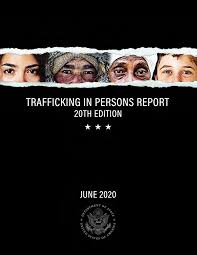By: Nyima Sillah
Considering the fact that many women and girls are always undergoing some pains during their monthly circle, some people are contemplating of pushing to the central government to introduce a menstrual recess in the country to help them relax and recuperate from the pain.
People’s opinion on this issue differ as it was regarded to be a natural pain that affects matured women and girls monthly whenever it is the period.
However, research has shown that one (1) out of ten (10) girls in The Gambia miss school every month due to poor menstrual hygiene and the pain they go through. Another challenge faced is the inability to manage their period and the pain they go through during their cycle.
However, for this to be considered by the central government, people have given out their opinions on the issue as this reporter gathered.
Fatima Jarju, a women’s rights activist outlined that women and girls go through a lot during their menstrual cycle which affects numerous of them in workplaces and schools.
According to her, women and girls face numerous challenges before or during their cycle among which she said during ovulation, they feel breast heaviness, lack of appetite, and sometimes moody while they go through a lot of abdominal pain.
“Policy would be a very good one, because if there’s a policy not for just women going to work, but girls that are going to school because if you’re absent at the end of the day you miss a lot in school, and a lot of girls during their ovulation or menstruation, they would be absent in schools for 3-4 days and this is not their fault,” she said.
She further explained that if one has a cramp, such a person will go through a lot of pain and will work with that pain because they signed up for it. Sometimes it will make such a person not even productive, so women or girls suffer from that which is very unfair.
“I would be a big advocate for this and I believe this should be happening because it is natural and no one deserves to work when you are going through pain. This should be something that should be highly recommended,” she said.
In a similar development, Fatoumatta Sanneh, the Chief Executive Officer of Fateemah’s Pad Drive said “In the society that we live in, the monthly circle is seen as a Taboo the subject is hardly discussed in both homes and workplaces.
“I believe that the government or employers should give those employees periodic leave because most of them are very unproductive due to different experiences. Like breast pain, diahoarrea, and so on. So, someone in that conditions might not actually be productive and get angry easily which is not ok for a working environment, a person observing her period must be given a periodic leave,” she suggested.
Njie Baldeh, the Secretary-General, Network of Gender Journalists for Women and Cultural Advancement (NoGJWCA) said introducing menstrual recess would be a good idea, the government should at least give women priority when they are observing their menstrual cycle.
He said, “if women are working and come suddenly see their menstrual cycle started, most of them always find it very difficult to cope with especially when they are at work or school. So, the government should look into the matter and find ways and means whereby they can be allowed to stay back at home when that happens to them.”
Baldeh however, advised the Women’s Bureau in collaboration with the Ministry of Women Affairs to look into the matter and advocate for more of this to be put into consideration. “Periodic recess should be given priority just like the maternal leave.” He said.
On the contrary, Phebian Ina Grant-Sagnia, a health worker mentioned that there is no need for the government to introduce a periodic leave, “menstruation is a natural process I believe that all women are going through. Menstruation does not need that. You can always do self-therapy. You don’t see your period as if you are going to take a leave no! You go along with it,” she said.
“Whilst the blood is flowing, you just need to be hit up like walking, doing some exercise, drinking hot water to help the blood flow out easily. So there’s no need to seat at home saying you seeing your monthly period,” she disagreed.
However, Betty Ceesay, a student at the University of The Gambia said “I don’t think we are in the state to give out periodic rest, just look at the number of women and girls that would miss school and working days during every month. It’s painful, but you have drugs, hot water, and so on. I think we should try to move on with it till later.
“This can also affect women in another way round. Already we have seen complaints about the duration of maternal leave so if periodic leave or recess should also be introduced, a lot of organizations aren’t going to consider employing more women as they should be,” she pointed out.
Furthermore, Yadi Njie Eribo, the Women’s Affairs Coordinator (FAWEGAM) “I don’t think a menstrual period recess is necessary nor should it be introduced. The period is not a disability or sickness, as girls grow up we train them on how to care for themselves. If we introduce this, it will be another tool that can be used to hurt women’s careers, development, and opportunities in the workplace,” she advised.
She noted that if a woman misses at least 5 to 8 days every month from school or work, that in a year, it amounts to 60 to 96 days which is equal to 2 to 3 months of absence annually. That woman cannot develop her career if she misses so many days in the month.
“Women have been having periods since the beginning of mankind and it has not stopped women one bit, women are in all kinds of fields including the military, and leadership positions, they also care for their families and have not been stopped. Let’s not retard the progress of women,” she advanced.
Ousman Jammeh, a UTG Student suggested saying that “I think the Government should have periodic recess laws instead of her intervention in introducing periodic recess for implementation. “The fact that priority is given to all organizations in creating their own rules & regulations (laws) it is a stepping stone for employers to introduce such, but not the Government,” he added.
He said that the country is a tax base economy that also depends on importation and that if the Government implements this it might not be favorable and can cause serious slacks in most institutions.
Fallu Sowe, the National Coordinator for Network against Gender-Based Violence suggested that “I think that should be left with organizations. Organization should be gender friendly and have gender friendly policies that would allow women and girls working with them to have 2-3days off especially when they know that their experiences are serious because during that time they might not be effective at work.”
However, he said if it should be given to the government as law, some women might not experience such pain and It might stop organizations from employing women, especially in the private sector.
Adding that wouldn’t be to the benefit of women and girls because, profit-making institutions, they will always count that and use it as an excuse not to employ young women and girls.
“Remember the 6 months maternal leave, is making a lot of young women unable to get employment even some of the organizations will try not to give them all the 6 months leave due to the duration and the loss it will have on the company. So, adding 3-4 days off every month will not be advantageous to women,” he enunciated.





